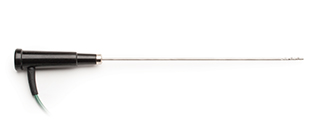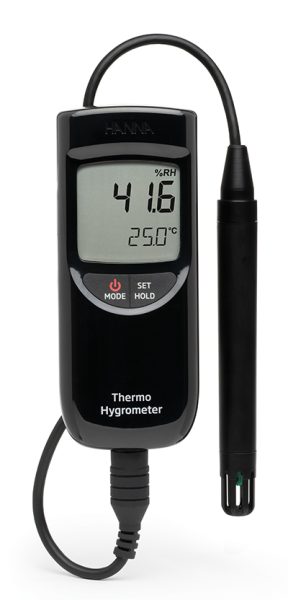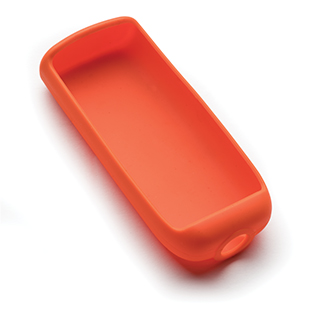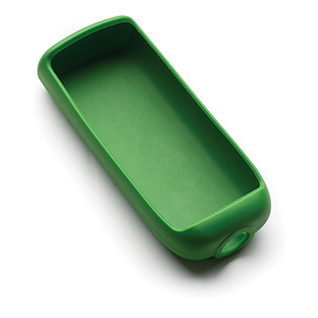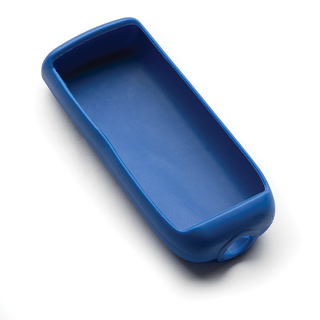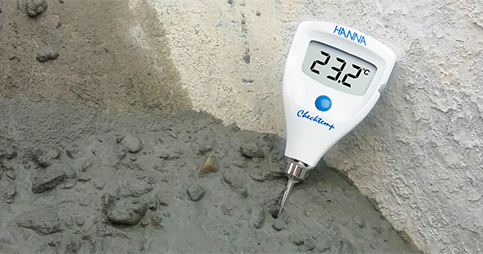
The hydration temperature (reaction of cement with water) raises the temperature of the concrete to 25 ° C during the process of maturation (hardening) of the concrete. Due to that, the concrete expands and does not achieve homogeneous strength in its entire volume. By hardening, the concrete cools and cracks due to contractions or volume reduction.
It is important that the pouring temperature of the cement is as low as possible in order to remain within satisfactory limits during the maturing process.
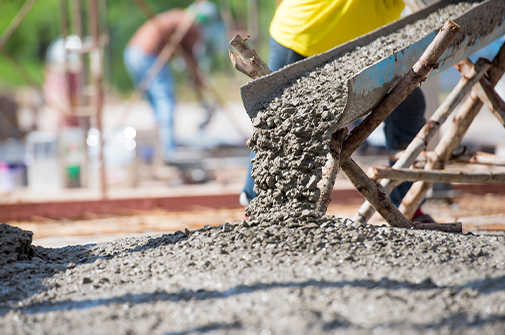
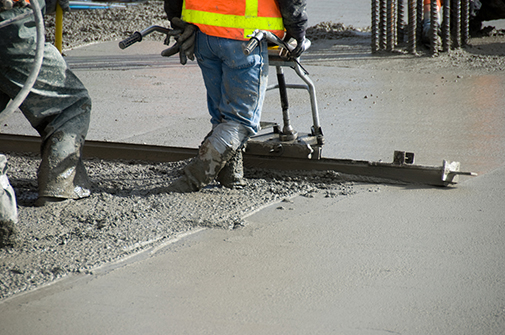
The main problem for the strength and maturation of concrete is not the air temperature, but the temperature at which the hydration process takes place.
Once the cement is hydrated, it rapidly begins to absorb large amounts of water, which further leads to the phenomenon of accelerated crystal formation around the aggregate particles (gravel, crushed stone, metal chips, etc.).
Crystal formation accelerates with increasing temperature. This accelerated reaction means that the crystals do not have enough time to strengthen, which later affects the strength of the concrete itself.
In these cases, the initial strength is high, but after 28 days (how long the concrete matures), the concrete formed in this way becomes weak.
If fresh concrete is about 10 ° C warmer than normal (for example 30 ° C instead of 20 ° C), the final compressive strength will be about 10% lower.
Cement concrete should be installed as soon as possible after preparation, so as not to reduce the possibility of its installation, ie before the start of cement setting (not more than 1.5 hours).
The temperature of fresh cement concrete during installation must be at least 7 ° C (in exceptional cases 3 ° C) and at most 25 ° C (in exceptional cases 30 ° C). The temperature of the formwork or base for cement concrete must be between 3 ° C and 40 ° C.
Hanna Instruments has high-precision, easy-to-use thermometer solutions for measuring temperature in the construction industry.

| Bitumen type | Temperature of produced bituminous mixture (° C) | |
| recommended | the highest | |
| B 160/220 | 140 ± 10 | 165 |
| B 100/150 | 145 ± 10 | 170 |
| B 70/100 | 150 ± 10 | 175 |
| B 50/70 | 160 ± 10 | 180 |
| B 35/50 | 170 ± 10 | 190 |
The bituminous mixture may only be installed under appropriate weather conditions. The recommended and lowest temperature of the bituminous mixture at the installation site are in relation to the type of binder used for production specified in the table:
| Bitumen type | Temperature of bituminous mixture during installation (° C) | |
| recommended | the lowest | |
| B 160/220 | 135 | 110 |
| B 100/150 | 140 | 115 |
| B 70/100 | 145 | 120 |
| B 50/70 | 155 | 130 |
| B 35/50 | 165 | 140 |

HI98501
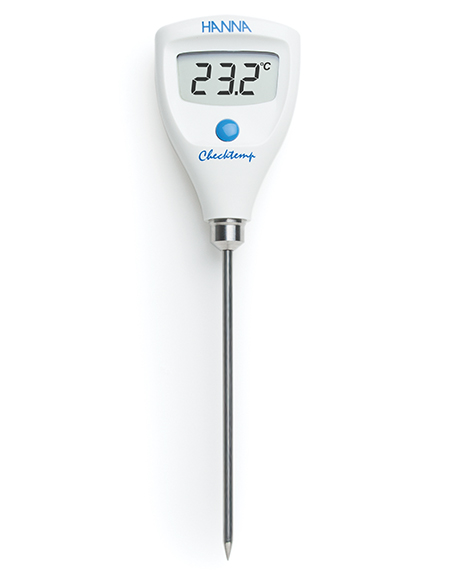
- Large display
- Selection of temperature units ° C or ° F
- Waterproof housing IP65 degree of protection
- Stainless steel probe AISI316
- Measuring range : -50.0 to 150.0°C
- Resolution: 0.1°C (-50.0 to 150.0°C)
- Accuracy: ±0.2°C (-30 to 120°C) ±0.3°C (outside: -50.0 to -30.0°C and 120.0 to 150.0°C)
- Probe: fixed, stainless steel, penetration
- Battery / Battery life: CR2032 Li-ion / Approx. 2000 hours of continuous use
- Auto off: 8 min (default), 60 min or OFF
- Environment: -30 to 50 ° C (-22 to 122 ° F); IP65
- Dimensions: 50 x 185 x 21 mm (2 x 7.3 x 0.9 ’’)
- Weight: 50 g (1.8 oz.)
HI935003
This thermometer is compatible with K-type thermocouple probes to provide the greatest accuracy and offers a large range of temperature measurement; from -50 to 300°C (-58.0 to 572°F).
Features include waterproof casing (rated IP65), CAL Check, low battery detection, auto-off capability, and long battery life.
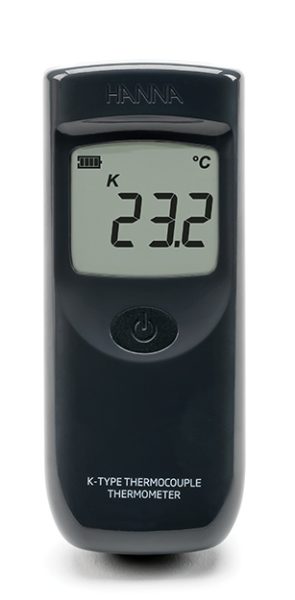
- Compatible with K-type thermocouple probes
- CAL Check™ feature
- Remaining battery life indication/low battery detection
- Auto-off
- IP65 waterproof housing
- Range: -50.0 to 199.9 ° C / 200 to 300 ° C; -58.0 to 399.9 ° F / 400 to 572 ° F
- Resolution: 0.1 ° C (-50.0 to 199.9 ° C) / 1 ° C (200 to 300 ° C); 0.1 ° F (-58.0 to 399.9 ° F) / 1 ° F (400 to 572 ° F)
- Meter accuracy (@ 23.0 ° C ± 5 ° C): ± 0.4 ° C (-50.0 to 300 ° C) ± 0.7 ° F (-58.0 to 572 ° F)
- Response time for 90% of the final value: 20 seconds
- Battery type/ life: 1.5V AAA (3) / approximately 3500 hours of continuous use; user-selectable auto-off after 8 or 60 minutes of non-use (can be disabled)
- Environment:
Rated operating condition: -20 to 50 °C (-4 to 122 °F), limiting condition: -30 to 50°C (-22 to 122°F), storage and transportation condition: -40 to 70°C (-40 to 158°F), relative humidity 100% - Storage/transport temperature: -40 to 70°C (-40 to 158°F)
- Dimension: 140 x 57 x 28 mm (5.5 x 2.2 x 1.1’’)
- Mass: 178 g (6.27 oz.)
Penetration probes for semi-solid samples

Our optional HI710027 blue shockproof rubber boot offers maximum impact protection.
HI766TR1
Response time: 10 seconds
Probe dimensions: L 500 mm x dia 10 mm (19.7 x 0.39’’)
Probe material: stainless steel
Cable lenght: 1m/ (3.3’)
HI766TR2
Response time: 14 seconds
Probe dimensions: L 1000 mm x dia 10 mm (19.7 x 0.39’’)
Probe material: stainless steel
Cable lenght: 1m/ (3.3’)
HI766TR3
Response time: 10 seconds
Probe dimensions: L 1500 mm x dia 10 mm (19.7 x 0.39’’)
Probe material: stainless steel Cable lenght: 1m/ (3.3’)
HI766TR4
Response time: 10 seconds
Probe dimensions: L 2000 mm x dia 10 mm (19.7 x 0.39’’)
Probe material: stainless steel
Cable length: 1m/ (3.3’)
K, J, T-Type Thermocouple Thermometers
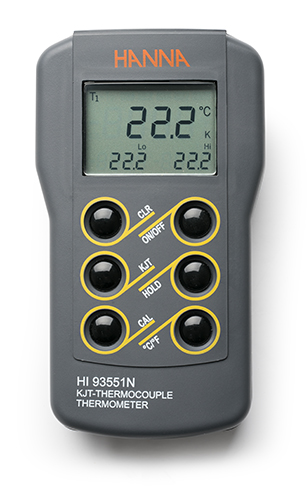
The HOLD button freezes the display to allow the user time to record readings. The CLR button restarts the evaluation of high and low values.
These thermometers display the current temperature along with the high and low extremes achieved during measurement.
For high accuracy, the HI93551N features a CAL button to allow the operator a simple one-point calibration in an ice bath at 0°C when probe interchange occurs.
The instruments are equipped with BEPS (Battery Error Prevention System), which alerts the user in the event that low battery power could adversely affect readings.
- Range: K -200.0 to 999.9°C and 1000 to 1371°C; -328.0 to 999.9°F and 1000 to 2500°F J -200.0 to 999.9°C; -328.0 to 999.9°F i 1000 to 1832°F J -200.0 to 999.9°C; -328.0 to 999.9°F and 1000 to 1832°F T -200.0 to 400.0°C; -328.0 to 752.0°F
- Resolution: K– 0.1°C (-149.9 to 999.9°C); 0.2°C (-200.0 to -150.0°C); 1°C (1000 to 1371°C); 0.1°F (-24.9 to 999.9°F); 0.2°F (-249.9 to -25.0°F); 0.3°F (-328.0 to -250.0°F); 1°F (1000 to 2500°F) J– 1°C (-200.0 to 999.9°C); 0.1°F (-149.9 to 999.9°F); 0.2°F (-328.0 to -150.0°F); 1°F (1000 to 1832°F) T– 0.1°C (-149.9 to 400.0°C); 0.2°C (-200.0 to -150.0°C); 0.1°F (0.0 to 752.0°F); 0.2°F(-270.0 to -0.1°F); 0.3°F (-328.0 to -270.1°F)
- Accuracy: ±0.5°C (-100.0 to 999.9°C); ±1°C (outside); ±1°F (-148.0 to 999.9°F); ±1.5°F (outside) (for 1 year, excluding probe error)
- Probe: HI766 series K-type thermocouple (not included)*
- Battery Type / Life: 5V AA (3) / approximately 500 hours of continuous use (with backlight off); auto-off after 60 minutes of non-use (can be disabled); auto-off after 8 minutes (HI93551R)
- Environment: 10 to 60°C (14 to 122°F); RH max 100%
- Dimensions / Weight: 150 x 80 x 36 mm (5.9 x 3.1 x 1.4’’) / 235 g (8.3 oz.)
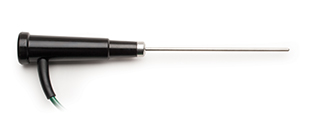
HI766E1
data-logging probe
HI9564 and HI9565 are portable thermo-hygrometers designed to measure temperature and Relative Humidity (RH). HI9565 presents the added advantage of being able to calculate the dew point from the temperature and RH.
To ensure maximum protection against the effects of humidity and condensation, the instruments are housed in a rugged, water-resistant casing.
The temperature and RH probe is a “smart probe” which consists of a factory calibrated electronic sensor which requires no user calibration. Our “smart probes” will work with any of our meters without the need to recalibrate as the electronic sensor tracks the performance and stores the calibration history directly onto the probe.
Simultaneous RH and temperature measurements on a large, dual-line LCD display, selectable temperature unit (°C or °F).
HI706023 dedicated temperature and RH probe with electronic sensor, quick connect probe, battery life indication and low battery detection, stability indicator, auto-off function, waterproof casing IP67, MIN, MAX value and HOLD indicator, stability indicator.
RH
Range: 0.0 to 100.0 % RH
Resolution: 0,1 % RH
Accuracy: ±2.5 % RH (0 to 90 % RH); ±3.5 % RH (90 to 100 % RH);
Temperature
Range: -10.0 to 60.0°C / 14.0 to 140.0°F
Resolution: 0.1°C / 0.1°F
Accuracy: ±0.4 °C / ±0.8 °F
Probe : HI706023 RH/temperature probe
Battery Type / Life: 1.5V AAA / 10,000 hours of continuous use
Auto-off: User selectable: after 8 minutes, 60 minutes or disabled
Environment: 0 to 60 °C (32 to 140 °F); 98 % RH non-condensing
Dimension: 154 x 63 x 30 mm (6.1 x 2.5 x 1.2”)
Weight: 196 g (6.91 oz.)
Dewpoint temperature (HI9565 only):
Range: -20.0 to 60.0°C / -4.0 to 140.0°F
Resolution: 0.1°C / 0.1°F
Accuracy: ±2°C /±4°F (50 to 85 % RH and 15 to 40°C); ±4.5 °C /±9 °F (outside)
Shockproof orange silicon rubber boot
Author:
graduate chemist of general chemistry
Reference:
– Technical conditions for road construction in the Republic of Serbia – PE Roads of Serbia


